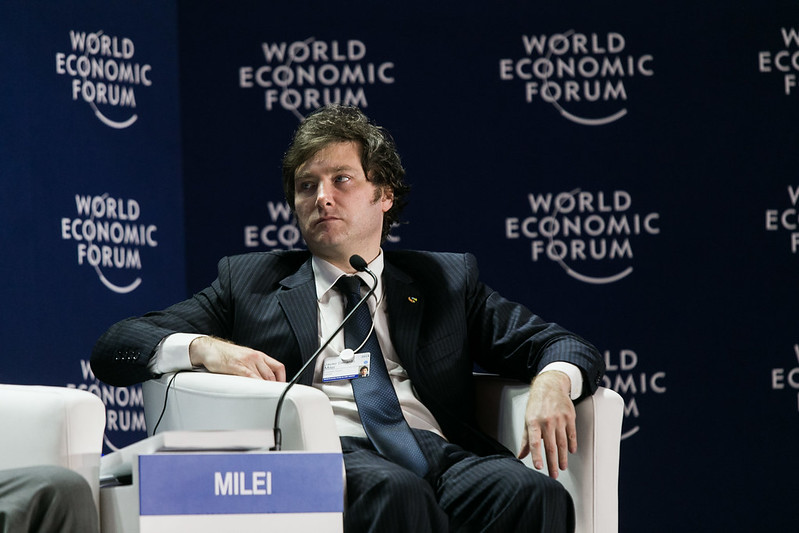
Javier Gerardo Milei, Chief Economist, Corporacion America, Argentina at the World Economic Forum on Latin America in Panama City 2014. Copyright by World Economic Forum / Benedikt von Loebell. License.
Countries like China and Russia are seeking ways to accelerate de-dollarization around the world, but the dollar remains so attractive that some countries have already abandoned their own national currencies in favor of the dollar, and others may do the same. At the Cato Institute, Gabriela Calderon de Burgos explains dollarization, writing:
Since Javier Milei not only made the campaign for Argentina’s presidency a three‐horse race but became the likeliest to occupy the Casa Rosada this coming December, there has been much reporting in the international press about dollarization, his frontline proposal. On this topic, there seems to be plenty of confusion, and so I’d like to recommend what I consider are essential readings to clear the fog.
Let’s begin with the books. Central bankers and their fans tend to be allergic to the very idea of dollarization. By and large, they have not been trained on the topic. For a quick monetary history lesson, I recommend Nobel laureate F.A. Hayek’s classic The Denationalisation of Money (originally published in 1976). This will give you a brief background on the history of money and central banking and the philosophy behind what makes money universally accepted.
If you want to jump straight into dollarization, the best and most practical book is Manuel Hinds’ Playing Monopoly with the Devil: Dollarization and Domestic Currencies in Developing Countries (2006). Hinds explained to me that he did not intend to write a book on dollarization, but merely a practical manual to persuade his fellow Salvadorans that it was the right monetary regime for El Salvador when he was Minister of Finance. In the end, he ended up putting together a clever way of explaining why national currencies in developing countries fail to live up to their promises.
One should also view the recent online event Cato held with Hinds and Emilio Ocampo, Milei’s main adviser on dollarization.
After this, you can follow up with Hinds and Ben Steill’s Money, Markets and Sovereignty (2009) where, in offering a superb defense of economic liberalism, they explain how eras of liberal trade have coincided with a universal monetary standard (a.k.a., the US dollar).
There has been a lot of talk in recent years about the supposedly imminent fall of the dollar’s reign. For this, it is worth reading Ronald McKinnon’s The Unloved Dollar Standard: From Bretton Woods to the Rise of China (2012). He explains how the US dollar came to be the international currency it is today and how this standard facilitates international trade. I found this book helpful in the dollarization discussion in Ecuador because it demolishes one of the most enduring macroeconomic fallacies: that the exchange rate should be used to correct trade imbalances across countries.
To understand why dollarization is essential for a developing country with weak institutions, read Steve Hanke’s essay, “Reflections on the Rule of Law and Dollarization in Ecuador” (2015). More recently, but along the same lines, Cato published “Money, Stability and Free Societies” (2020), also by Hanke. It is worth quoting the beginning of this essay to get a taste of why this matters so much:
“Monetary instability poses a threat to free societies. Indeed, currency instability, banking crises, soaring inflation, sovereign debt defaults, and economic booms and busts all have a common source: monetary instability. Furthermore, all these ills induced by monetary instability bring with them calls for policy changes, many of which threaten free societies. One who understood this simple fact was Karl Schiller, who was the German Finance Minister from 1966 until 1972. Schiller’s mantra was clear and uncompromising: ‘Stability is not everything, but without stability, everything is nothing’ (Marsh 1992: 30). Well, Schiller’s mantra is my mantra.”
Read more here.
If you’re willing to fight for Main Street America, click here to sign up for the Richardcyoung.com free weekly email.




